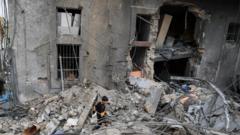During a recent address, UN Secretary-General António Guterres denounced Israel's blockade of aid to Gaza, claiming it has caused severe humanitarian distress. In stark language, he described Gaza as a "killing field," highlighting the urgent need for international intervention. Israel's government rebutted these criticisms, asserting that aid has been delivered.**
Guterres Condemns Israel's Gaza Aid Blockade as ‘Floodgates of Horror’**

Guterres Condemns Israel's Gaza Aid Blockade as ‘Floodgates of Horror’**
UN Secretary-General António Guterres expresses grave concerns over humanitarian crisis in Gaza amidst renewed Israeli blockade.**
In a pointed address at the United Nations headquarters, Secretary-General António Guterres on Tuesday vehemently condemned Israel's renewed blockade of humanitarian aid to the Gaza Strip, asserting that it amounted to a breach of international obligations and had unleashed "the floodgates of horror" upon the Palestinian population.
"The situation in Gaza is intolerable," Guterres lamented, emphasizing that civilians are trapped in a devastating cycle of violence and deprivation. He noted that for more than a month, no humanitarian aid has been delivered, leaving residents without essential resources such as food, fuel, and medicine. "As aid has dried up, the floodgates of horror have reopened, trapping civilians in an endless death loop," he stated.
These remarks represent a significant escalation in Guterres' rhetoric regarding Israel's actions in the ongoing conflict with Hamas. Senior officials at the U.N. have been increasingly vocal about the perceived apathy within the international community, including long-time allies of Israel, over the humanitarian crisis that has developed as hostilities continue.
In response, the Israeli Foreign Ministry dismissed Guterres' statements as "slanderous," arguing that more than 25,000 aid trucks had entered Gaza during a prior ceasefire, alleging that Hamas had misappropriated this assistance to fortify its military capabilities. Oren Marmorstein, a spokesman for the ministry, asserted that the narrative surrounding humanitarian aid fails to address the necessity for Hamas to relinquish control over Gaza.
Furthermore, Guterres reminded the global audience that as the occupying power, Israel has inescapable responsibilities under the Geneva Conventions to ensure the safety and health of the Palestinian people, encompassing the provision of essential services and healthcare.
"The situation in Gaza is intolerable," Guterres lamented, emphasizing that civilians are trapped in a devastating cycle of violence and deprivation. He noted that for more than a month, no humanitarian aid has been delivered, leaving residents without essential resources such as food, fuel, and medicine. "As aid has dried up, the floodgates of horror have reopened, trapping civilians in an endless death loop," he stated.
These remarks represent a significant escalation in Guterres' rhetoric regarding Israel's actions in the ongoing conflict with Hamas. Senior officials at the U.N. have been increasingly vocal about the perceived apathy within the international community, including long-time allies of Israel, over the humanitarian crisis that has developed as hostilities continue.
In response, the Israeli Foreign Ministry dismissed Guterres' statements as "slanderous," arguing that more than 25,000 aid trucks had entered Gaza during a prior ceasefire, alleging that Hamas had misappropriated this assistance to fortify its military capabilities. Oren Marmorstein, a spokesman for the ministry, asserted that the narrative surrounding humanitarian aid fails to address the necessity for Hamas to relinquish control over Gaza.
Furthermore, Guterres reminded the global audience that as the occupying power, Israel has inescapable responsibilities under the Geneva Conventions to ensure the safety and health of the Palestinian people, encompassing the provision of essential services and healthcare.


















